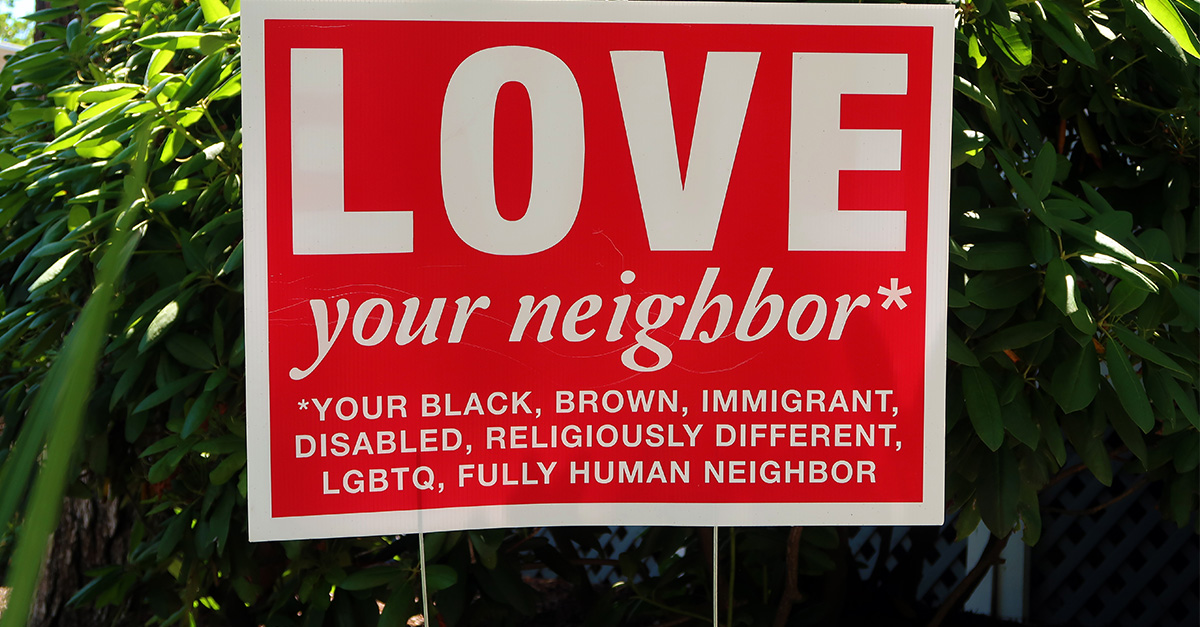


Get a free copy of Parental Rights & Education when you subscribe to our newsletter!

The foundation of biblical love is God’s holy and righteous law. That’s where the conversation ought to begin any time a politician or a pundit invokes love thy neighbor as grounds to adopt a specific proposal.
Have you noticed that there is a growing trend to take Jesus’ admonition to love our neighbor as ourselves and morph it into a leftwing policy platform?
Consider the following:
There are plenty of other examples, but you get the point.
The famous passage in Mark 12:31 is being used as a placeholder to baptize liberal follies with Gospel-sounding language.
Not only is this tactic lazy, but proponents of it are hoping conservatives don’t ask any follow-up questions.
Questions like…
And yet, the outward show of “love” regarding these politically charged topics generally falls on the left side of the debate, as if Christians are limply supposed to accept progressive overreach because a Bible verse was quoted out of context.
In fact, in the ongoing attempts to “Christianize” leftist causes, we are now at the stage where love your neighbor is being used to support conduct that is explicitly repudiated by God’s Word, like theft and murder.
But before we get to those details, the first step we need to take is to define love from God’s perspective. This mindset keeps us grounded biblically so we don’t end up like children who are tossed to and fro by every wind of doctrine (Ephesians 4:14).
For that definition let’s examine how the Apostle Paul tackles the subject, which we find in Romans 13:8-10:
“Owe no one anything, except to love each other, for the one who loves another has fulfilled the law. For the commandments, ‘You shall not commit adultery, You shall not murder, You shall not steal, You shall not covet,’ and any other commandment, are summed up in this word: ‘You shall love your neighbor as yourself.’ Love does no wrong to a neighbor; therefore love is the fulfilling of the law.”
To love our neighbor, then, is to not steal from him, to not lie about him, to not kill him, to not defraud him, and so on and so forth. Our vertical relationship with God — represented by the first four of the Ten Commandments — guides our horizontal relationship toward others, which is embodied by the last six of the Ten Commandments.
Put differently, the foundation of biblical love is God’s holy and righteous law. That’s where the conversation ought to begin any time a politician or a pundit invokes love thy neighbor as grounds to adopt a specific proposal.
Unfortunately, that doesn’t happen today, even within Christian circles.
Remember Oliver Anthony’s smash single “Rich Men North of Richmond”?
The music artist vented frustration with D.C. elites, with onerous taxes, and with the “obese milkin’ welfare” off those taxes.
Listeners seemed to agree.
The song landed at the top of the Billboard charts.
One writer at Christianity Today was not amused by Anthony’s lyrics, however.
She accused him of “trafficking in easy caricatures and political tropes” and opined that he didn’t “honor” the “God-given humanity” of people on welfare.
The title of the article said it all: “Oliver Anthony’s Viral Hit Doesn’t Love Its Neighbors.”
For the record, food stamp fraud alone could be as high as $4.7 billion a year, according to one watchdog group. This means Anthony’s instincts appear to be correct: Some people really are milkin’ government programs.
Forget that fact for a moment, though.
Here we have a supposedly renowned evangelical publication openly defending the welfare state as an extension of neighborly love.
This is the same welfare state that is literally built on theft and envy — the very opposite of what the Bible esteems as love.
Is it acceptable to plunder the goods of one person in order to aid another person who may be struggling financially?
Of course not.
Stealing is stealing.
There isn’t a social justice exception to the Eighth Commandment, whether those actions are taken by individuals or by magistrates.
We pay taxes to civil authorities to keep the peace and maintain order, not to redistribute wealth and stir up resentment between income brackets.
When love is divorced from its scriptural underpinning, the immoral entity that is the welfare state becomes catechized as an article of faith, even though its very existence flouts God’s yardstick for what constitutes a loving deed.
What’s worse, this textual abuse has been applied to abortion — not in banning the gruesome practice but in encouraging it!
Last year, Gov. Gavin Newsom paid for billboards in pro-life states that advertised California as a destination to receive unrestricted abortion “care” for out-of-area residents who were impacted by new laws banning or limiting the procedure.
That a radical abortionist like Newsom would pull a stunt like this wasn’t news, but how he organized the stunt did make news.
His ad read: “Need An Abortion? California Is Ready To Help,” and it signed off with a website to visit and by quoting Mark 12:31: “Love your neighbor as yourself. There is no greater commandment than these.”
Obviously Newsom’s message was intended to be gratuitously provocative.
Still, these distortions will happen more frequently if the Bible continues to be deconstructed through ideological dogmas that aren’t built upon truth.
As Christians, the best way to combat the misuse of Jesus’s words is to affirm a simple reality: The nature of love cannot be captured apart from God’s expression of it, which has been revealed in Scripture.
Slimy politicians from the West Coast and cultural appeasers within the Church won’t like that answer because it serves as a restraint on their progressive ambitions.
Oh well.
Ready to dive deeper into the intersection of faith and politics? Head over to our Theology of Politics series page, where we’ve published several long-form pieces to help Christians navigate where their faith should direct them on political issues.
